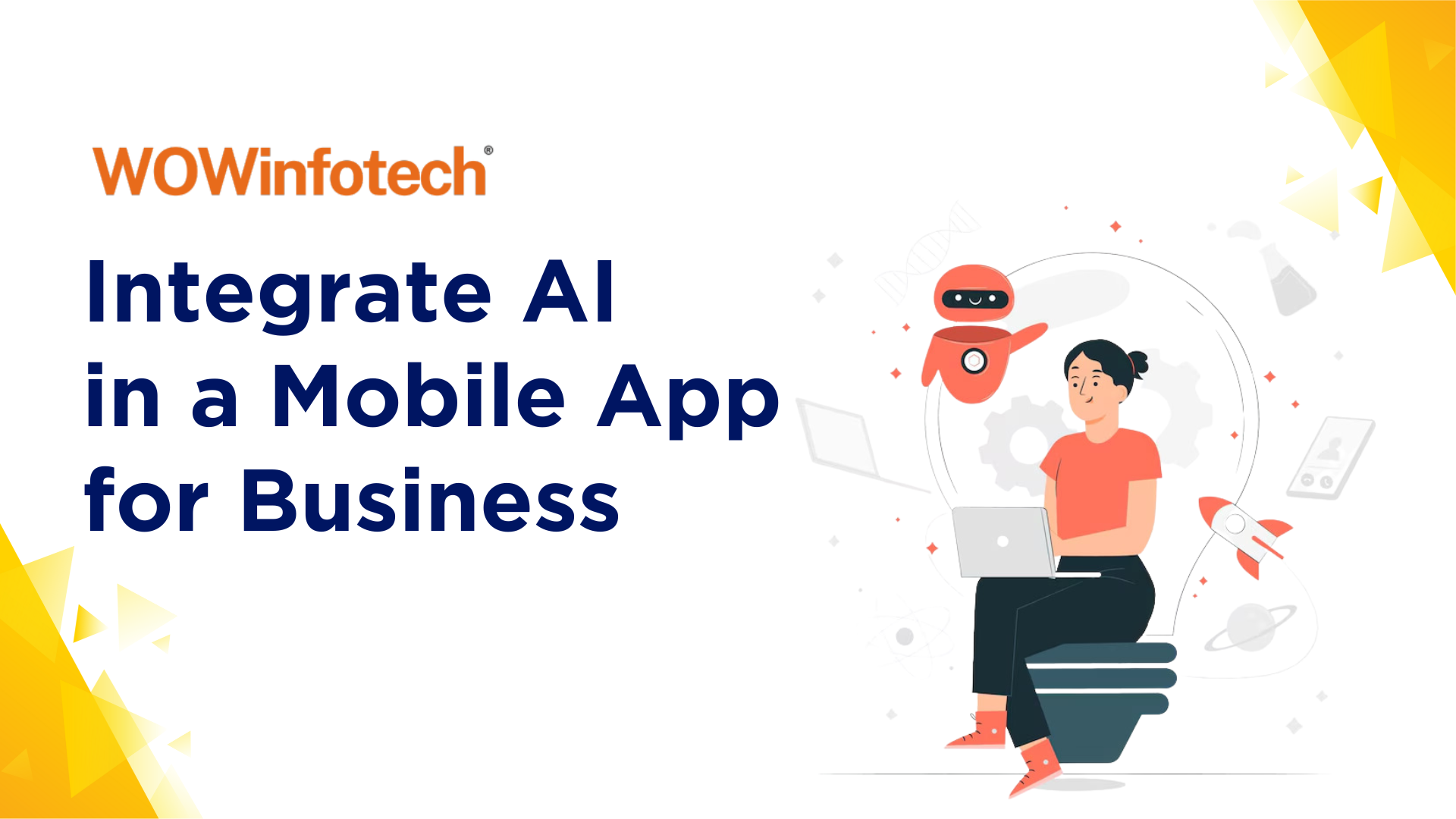As technology rapidly advances, the integration of Artificial Intelligence (AI) into mobile applications has become a game-changer for businesses. AI-powered mobile apps offer a wide range of benefits, from enhanced user experiences to improved operational efficiency. By leveraging the power of AI, businesses can streamline their processes, make data-driven decisions, and stay ahead of the competition.
In this blog, we will explore the various ways in which AI can be integrated into mobile apps, the benefits it offers, and the best practices to ensure successful implementation. Whether you're a small startup or a large enterprise, this guide will provide you with the insights you need to harness the power of AI in mobile app development strategy.
Benefits of Integrating AI in Mobile Apps
Integrating AI (Artificial Intelligence) into mobile apps can provide numerous benefits for businesses and users alike. Here are 8 key advantages of incorporating AI technology into mobile app:
Personalized User Experience
AI-powered mobile apps can analyze user behavior, preferences, and past interactions to deliver a highly personalized experience. This can include tailored content, product recommendations, and intelligent assistants that cater to the individual user's needs.
Improved Efficiency and Productivity
AI can automate repetitive tasks, streamline workflows, and provide intelligent decision-making support. This can help users save time and increase their overall productivity, allowing them to focus on more strategic and value-added activities.
Enhanced Customer Support
AI-powered chatbots and virtual assistants can provide 24/7 customer support, answering common questions, resolving issues, and even anticipating user needs. This can lead to improved customer satisfaction and reduced workload for human support teams.
Predictive Analytics and Insights
AI algorithms can analyze vast amounts of data collected through mobile apps, providing valuable insights and predictive analytics. This can help businesses make more informed decisions, optimize their operations, and identify new opportunities for growth.
Improved Accessibility and Inclusivity
AI-powered features, such as voice recognition, natural language processing, and image recognition, can make mobile apps more accessible to users with disabilities, enhancing the overall user experience and promoting inclusivity.
Increased Engagement and Retention
By delivering personalized content, intelligent recommendations, and seamless interactions, AI-integrated mobile apps can keep users engaged, leading to higher retention rates and increased customer loyalty.
Competitive Advantage
Integrating AI into mobile apps can provide a competitive edge, as it allows businesses to offer innovative features, enhanced user experiences, and data-driven insights that may not be available in their competitors' offerings.
Cost Savings and Operational Efficiency
AI can automate various tasks, such as customer support, data analysis, and content curation, which can lead to cost savings and improved operational efficiency for businesses.
By using AI in mobile businesses can create more intelligent, user-friendly, and data-driven applications that deliver tangible benefits to their customers and their operations. As AI technology continues to evolve, the opportunities for integrating it into mobile apps will only continue to grow, making it an increasingly important consideration for businesses looking to stay ahead of the curve.
Different Types of AI for Mobile Apps
AI can revolutionize mobile apps by enabling various functionalities. Here are four key types of AI applications for mobile apps:
- Image Recognition Apps: AI can power image recognition apps, allowing users to identify objects, scenes, or people in images. These apps can be used for visual search, augmented reality experiences, or even for accessibility purposes.
- Language Translator Apps: With AI, language translator apps can provide accurate and real-time translations between different languages. Users can communicate effectively across language barriers, making travel and international business interactions smoother.
- Chatbot Apps: AI-driven chatbots can offer personalized customer support, automate responses, and enhance user engagement. These apps simulate human-like conversations, providing instant assistance and improving user experience.
- Virtual Assistant Apps: Virtual assistants powered by AI, like Siri or Google Assistant, can perform tasks, answer queries, set reminders, and more through natural language interactions. These apps streamline daily activities and enhance productivity.
By incorporating these types of AI into mobile apps, businesses can offer innovative solutions, improve user experiences, and stay ahead in the competitive mobile app market.
Best Practices for AI Integration in Mobile Apps
When integrating AI into mobile app, it's important to follow best practices to ensure a seamless and effective implementation. Here are four key best practices to consider:
- Clearly Define the AI Use Case: Before diving into AI integration, it's crucial to clearly define the specific problem you're trying to solve or the user experience you want to enhance. This will help you identify the right AI capabilities to integrate and ensure they align with business objectives.
- Prioritize User Experience: The integration of AI should be designed to enhance the user experience, not complicate it. Ensure that the AI-powered features are intuitive, easy to use, and provide tangible benefits to users.
- Ensure Data Privacy and Security: AI-powered applications often rely on user data to function effectively. It's essential to prioritize data privacy and security, adhering to relevant regulations and implementing robust data protection measures.
- Continuously Optimize and Improve
AI-powered features should be continuously monitored, tested, and optimized to ensure they remain effective and relevant to users. Regularly gather feedback, analyze performance metrics, and make iterative improvements to AI integration.
By following these best practices, you can ensure that AI integration in mobile apps delivers a seamless and valuable experience for users, while also aligning with business goals.
Future Trends in AI for Mobile App Development
The rapid rise of artificial intelligence (AI) has transformed the mobile app development landscape, and the future holds even more exciting possibilities. As AI continues to evolve, we can expect to see several key trends emerge in the integration of AI within mobile apps.
- Personalized User Experiences: AI-powered personalization will become increasingly sophisticated, allowing mobile apps to tailor content, recommendations, and user interactions to individual preferences and behaviors. This will enhance user engagement and loyalty.
- Intelligent Assistants: Virtual assistants powered by natural language processing and machine learning will become more prevalent in mobile apps, providing users with seamless, conversational interactions to complete tasks, access information, and make decisions.
- Predictive Analytics: AI algorithms will leverage user data to anticipate user needs and preferences, enabling mobile apps to proactively suggest relevant content, services, or actions, improving the overall user experience.
- Computer Vision and Augmented Reality: AI-powered computer vision will enable mobile apps to understand and interpret visual information, leading to more immersive augmented reality (AR) experiences and enhanced object recognition capabilities.
- Automated Content Generation: AI will be used to generate personalized, dynamic content for mobile apps, such as news articles, product descriptions, and social media posts, reducing the burden on human content creators.
- Edge Computing and Offline AI: As mobile devices become more powerful, AI processing will increasingly happen on the device itself, rather than in the cloud, enabling faster response times and more reliable performance, even in areas with limited internet connectivity.
These trends in AI for mobile app development will not only enhance the user experience but also drive innovation, improve business outcomes, and unlock new opportunities for mobile app developers and entrepreneurs.
The integration of AI in mobile apps offers numerous benefits such as personalized user experiences, improved efficiency, and enhanced customer support. Different AI applications include image recognition, language translation, chatbots, and virtual assistants. Best practices for AI integration emphasize clear use case definition, prioritizing user experience, ensuring data privacy, and continuous optimization. Future trends in AI for mobile apps include personalized experiences, intelligent assistants, predictive analytics, computer vision, automated content generation, and edge computing. Overall, AI integration enhances app functionality, user satisfaction, and business competitiveness, paving the way for innovation and improved outcomes in mobile app development.
Looking to integrate AI into your business app? WOWinfotech offers expert AI integration services to elevate app's capabilities and efficiency. Whether you're seeking AI solutions for personalized user experiences, predictive analytics, or intelligent assistants, we've got you covered.
Additionally, if you require app development services, WOWinfotech can help bring your app idea to life with our skilled team of developers. Contact us at +91 9370104077 or info@wowinfotech.com for more details on how we can assist you in enhancing business apps with AI or developing a new app tailored to your needs.
-

Krishna Handge
WOWinfotech
Apr 26,2024
